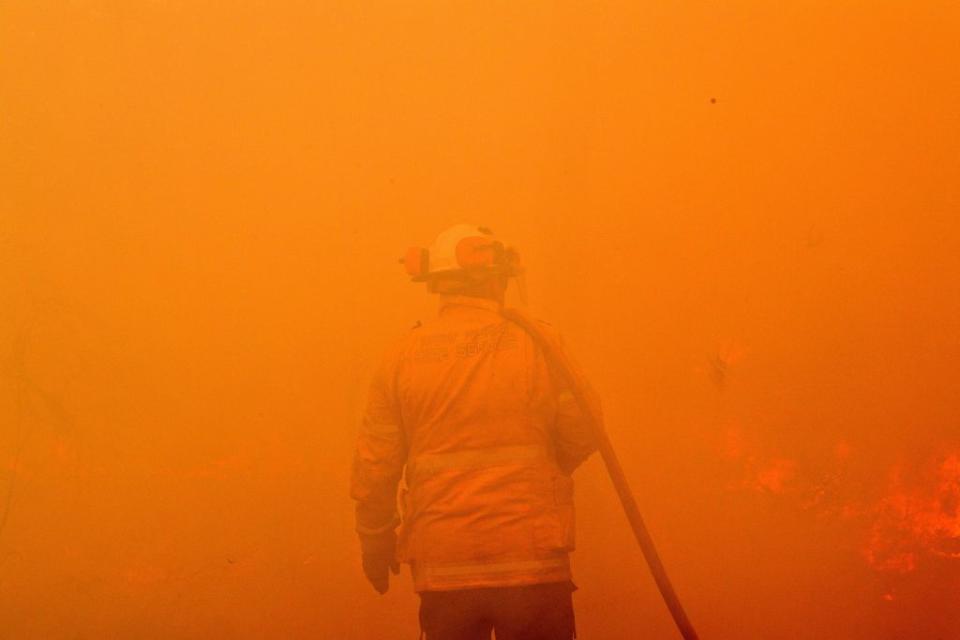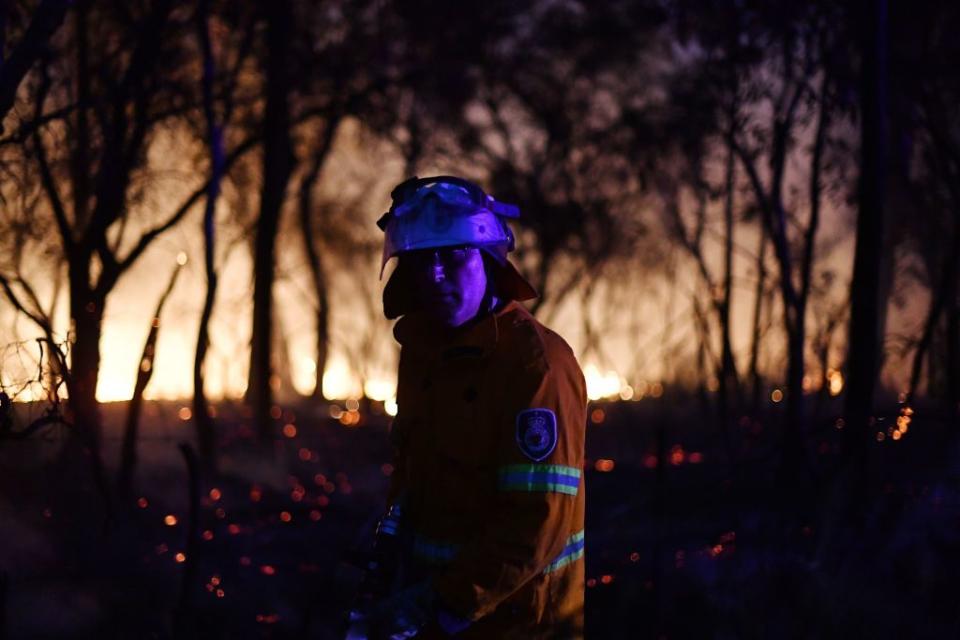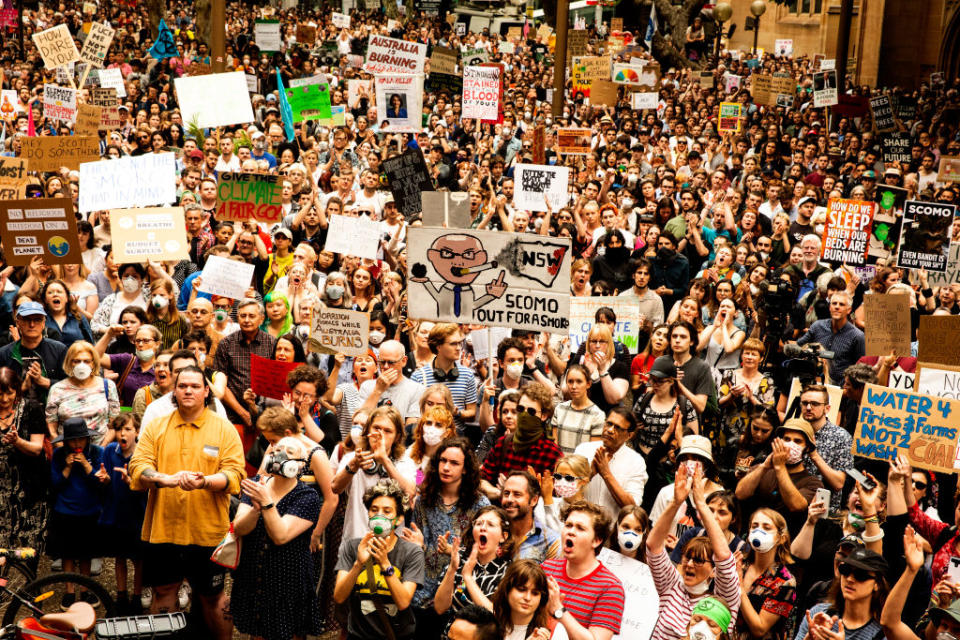Why we rely on volunteers to fight Australia's massive bushfires
The fire season is getting longer and harsher in Australia and yet a vast majority of those who risk their health fighting fires are unpaid volunteers.
These dads, mums, sons, brothers and sisters have their own jobs and responsibilities, but give up their time to defend their own and other communities when flames begin encroaching.
Few other areas of life demand this level of selflessness, but if that seems like a strange state of affairs, it’s one borne out of the inherent unpredictability of fires, the challenge of fighting them in such a large and scarcely populated land and a long history of responding to bushfires in this country.
Why does Australia rely on volunteers to fight bushfires?
Each state effectively has two sets of fire fighters. A professional group who are located in metropolitan stations and respond to the more constant demand of city fires, chemical spills, car accidents, and other hazardous emergencies.
In rural areas a vast majority of crews that have spent November and December battling blazes are doing so of their own personal accord and desire to help.
For instance, outside of Sydney, the mostly volunteer-run Rural Fire Service is responsible for defending more than 98 per cent of the state. New South Wales boasts the world's largest volunteer firefighting agency, consisting of more than 72,000 volunteers and just 911 total paid staff.
Man's horrendous burns after house was destroyed in bushfire
Firefighters turn to crowdfunding to raise money for essential equipment
'The worst is to come': Warning about bushfires bringing 'unprecedented losses'
From 2017 to 2018, NSW RFS members attended more than 24,000 incidents across the state, according to its website.
In Victoria, and other states and territories across Australia, it’s a similar situation. While there are paid rural firies, they are largely supplemented by volunteer members, like the CFA in Victoria who we couldn’t do without.

How do volunteers get time off work?
Despite the time they are giving up, there is no compensation scheme for volunteers or employers who might be willingly losing workers for days on end.
“The most important thing is the word volunteer. It is up to each individual to work out what they can provide to the service,” says Ben Shepard, the NSW RFS State Duty Media Officer.
“For a volunteer to be deployed to a fire they will need to have a conversation with their employer, and ultimately that is a discussion they will have with each other.
“On top of that we also have many people who are self employed giving up their time and we’re hugely grateful for them as well,” he told Yahoo News Australia.
Why don’t volunteers gets paid?
In other countries such as the Unites States where bushfires often cause havoc in states like California, firefighters are mostly paid, and emergency crews are not reliant on volunteers to anywhere near the same degree as seen in Australia.
“What we do see in other countries is that their fire crews are paid,” Mr Shepard said.
During particularly extreme conditions like what we’ve seen in recent weeks, overseas crews are often flown in to help, and can be surprised to learn they are fighting alongside so many volunteers.
“They do find what happens in Australia quite unique and I think they’re often in awe of how many people throw up their hand to help in times of natural disaster,” Mr Shepard said.

It’s the result of a myriad of factors, he said, including funding limitations and environmental and geographical factors, as well as Australia’s long-standing culture of pitching in to help out.
“We do live in a country where so many organisations are in a similar boat, such as surf life saving and meals on wheels,” he noted. “The actual value to this country of these volunteers, we’re talking in the billions.
“Australians will naturally want to help,” he said, adding that he expects an influx of people signing up due to the recent devastation.
Why are volunteer crews so needed?
Stuart Ellis is a former SAS officer and was the CEO and Chief Officer of the Country Fire Service in South Australia from 1996 to 2001, and understands the challenge facing the country during bushfire season.
Aside from the challenge of coming up with the requisite financial resources, volunteers on the ground can often provide highly valuable local knowledge and quick response times, he says.
“When volunteers are required, they need to be present in significant numbers and often close to the areas where the fires will occur,” Mr Ellis told SBS last month.
“They bring with them local knowledge and familiarity and expertise in the local fuels, weather conditions and topography.”

To pay a staff an ongoing wage to fight seasonal and unpredictable fires that burn in different parts of the country would be largely untenable, he said. Prime Minister Scott Morrison said there are no plans to change the system.
In times of crisis, there simply needs to be an all-hands-on-deck mentality and that has been the genesis of rural volunteer fire fighting groups across the country.
It’s not always so simple though, and in Victoria in particular, there has been a long history of conflict between paid and unpaid fire fighters who have opposed rule changes to give more power to professional firefighters over their volunteer counterparts and resources.
When did people being to volunteer?
During the 19th century, coordinated firefighting was non-existent, with many landowners forced to defend their own properties, according to the written history of the NSW Rural Fire Service.
Heading into the 20th century, the NSW State Government formalised control of fire prevention in response to particularly serious bushfires, which led to the formation of the first formal brigade at Berrigan in the State's south.
According to the Berrigan Advocate newspaper, the brigade was formally recorded in November 1900 at a meeting at the Royal Hotel on the Murray River. It is the first official record of a formal bush fire brigade in NSW.
Where does the funding come from?
The reliance on volunteers doesn’t necessarily mean fire services are inadequately funded, fire staff say.
“We are well funded by the state government and the bushfire fighting fund,” Mr Shepard told Yahoo News.
Funding comes from the insurance industry, as well as local, state and federal funding, he said. As well as public donations and contributions from the corporate sector.
“Many businesses consider being strategically aligned with us and our reputation, community standing and highly recognisable corporate identity as beneficial,” the RFS says on its website.
“A lot of that money does go towards things like tankers, training, personal equipment and providing the tools (volunteers) need to do their job,” Mr Shepard said.
PM responds to pressure for more funding
Prime Minister Scott Morrison has for weeks insisted professional and volunteer firefighters have all the resources they need, and on Tuesday dismissed the idea of paying volunteer firefighters.
The following day it was revealed that some volunteer firies had turned to crowdfunding to raise money for new protective equipment.
But on Thursday, he announced $11 million for the country's aerial firefighting capabilities.
The immediate cash injection will allow the National Aerial Firefighting Centre to buy more aircraft or extend current leases.
On Thursday morning Mr Morrison said he was advised firefighters had all the equipment they needed.
Mr Albanese said the prime minister needed to meet with fire chiefs and state leaders to discuss a range of resourcing issues as well as paid leave for fire volunteers from their usual workplaces.

“Each bushfire season we take the advice of the states and experts about what we can do to keep Australians safe,” Mr Morrison said.
“As we've said all along, my government stands ready to deliver whatever further assistance is asked of us by the states as they battle these devastating fires.”
Former NSW fire chief Greg Mullins welcomed the announcement.
“Fire seasons are overlapping,” he told ABC radio.
“Trying to share eight aircraft between all the states and territories ... if they're all burning at once, that's going to be a problem.”
Do you have a story tip? Email: newsroomau@yahoonews.com.
You can also follow us on Facebook, Instagram and Twitter and download the Yahoo News app from the App Store or Google Play.




